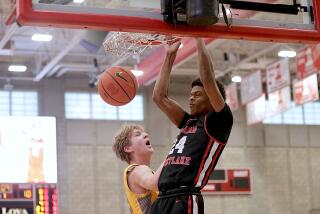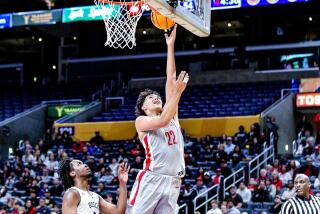High Life / A WEEKLY FORUM FOR HIGH SCHOOL STUDENTS : Mater Dei Junior Was Born to Ride : Equestrian: With her sense of humor and natural feel for horseback riding, it is easy to forget that Anne Greaves has a handicap.
- Share via
SAN JUAN CAPISTRANO — With a name like Anne Greaves, one might expect the Mater Dei High School junior to be a sober girl who mourns her misfortunes.
But upon meeting this bubbly 15-year-old, that misconception is quickly put to rest. Although she was born with a congenital limb deformity, it is easy to forget that she has prosthetic legs, a stump for a right arm and only three fingers on her left hand.
After she effortlessly guided her horse through the corral at the Fran Joswick Therapeutic Riding Center in San Juan Capistrano, Anne, whose family lives in Costa Mesa, put it in perspective: “I’m not really handicapped when I’m riding.”
Judging from her grace and excellent balance atop her favorite horse, Luvy, people might only be able to tell she’s physically challenged if they notice her clutching the reins by her three left fingers and see that she’s not controlling the horse with her legs the way able-bodied riders do.
“She’s got natural feel,” said Anthony Busacca, program director of the riding center. “No matter what horse she sits on, it’s like they’re part of the same unit; it’s like she was born to ride a horse.”
Greaves’ dedication and perseverance toward riding also help her accomplish such everyday tasks as getting dressed, writing and sketching. When asked if her handicap has prevented her from doing anything, she replied, “Not anything I’ve really wanted to do.”
That will include surfing and playing the guitar--two hobbies she’ll pursue as soon as the proper instructors can be found.
“She totally inspires us,” said Nancy Greaves of her youngest daughter. “Nothing gets her down. She’s not a complainer or a crier. Some people can’t handle it, but for some reason, she can.”
Anne credits her family’s sense of humor for her positive outlook.
“I think most of the reason why I have an OK attitude about it is because my family is really funny,” she said.
Case in point: On a family outing to the beach, Anne’s prosthetics were placed upside-down in the sand, to appear as if someone had been buried from the waist up.
Her humor has shined through even the most trying situations. Whereas most teens have no qualms about walking around Disneyland all day and night, Greaves tires rather easily. She usually ends up renting a wheelchair, but this too, becomes a tool for her humor. She likes to stand up during particularly long waits in line and announce: “I can walk! It’s a miracle!” . . . much to the surprise of those standing around her.
Many of the challenges Greaves has undertaken have been fueled by encouragement from the Joswick Center. She began the difficult task of horse jumping earlier this month, despite the resistance of saddle-makers to help her.
“We received a grant to get a special saddle made for her,” said Tracey Stotz, executive director of the center, “but they’re afraid of the liability, in case Anne should get hurt.” Through perseverance, the Joswick Center found a saddle-maker in Michigan who agreed to help.
There are about 400 such therapeutic riding centers throughout the country assisting people of all ages with mental and physical handicaps. But what is so beneficial about riding therapy?
“Overall, everyone is getting physical as well as psychological benefits,” Stotz said. “As these riders continue to ride with us, they strengthen their muscles--like when you get off a horse and your inner thighs are sore. The horse duplicates the walk of a human being like nothing else does.
“Psychological benefits include a boosting of self-esteem. They figure, ‘If I can keep control of this animal that weighs 1,200 pounds, I can do anything!’ ”
The Joswick Center, which serves 90 riders per week, is funded primarily through private donations from corporations and service groups. Thirteen percent of the funds are collected through monthly riding fees of $60. Participants who are unable to pay the fees can apply for financial need-based scholarships of up to $50 monthly. The community has helped in donating everything from volunteers to horses.
Eric Espinoza, 14, will be a freshman in special education classes at Mission Viejo High School in the fall. He said of the Joswick Center: “Being able to know how to ride is fun. Before I came here, I hadn’t dealt with horses. (Since then,) I’ve learned to trot, canter and how to do the two-point. I’ve also learned how to be a little bit more social with people.”
Recent Woodbridge High graduate Heather Adams, 19, is a 12-year veteran equestrian who has cerebral palsy. “It’s my legs,” she said of the horse. “I don’t have to walk.”
Greaves explained why she enjoys the Joswick Center: “Maybe some other place wouldn’t understand why I couldn’t do something.”
But aboard a horse, there’s not much she can’t do. Greaves, who began riding in the sixth grade, has won several first-place trophies and ribbons for her riding.
“She makes us all very proud,” Stotz said. “If she had her own horse and a little more training, she could compete just fine with able-bodied riders. She’s just outstanding.”
Not bad for a girl whose parents were told when she was a baby that she would never be able to walk on her own.
“I just started walking anyway,” she said with a smile.
More to Read
Get our high school sports newsletter
Prep Rally is devoted to the SoCal high school sports experience, bringing you scores, stories and a behind-the-scenes look at what makes prep sports so popular.
You may occasionally receive promotional content from the Los Angeles Times.






